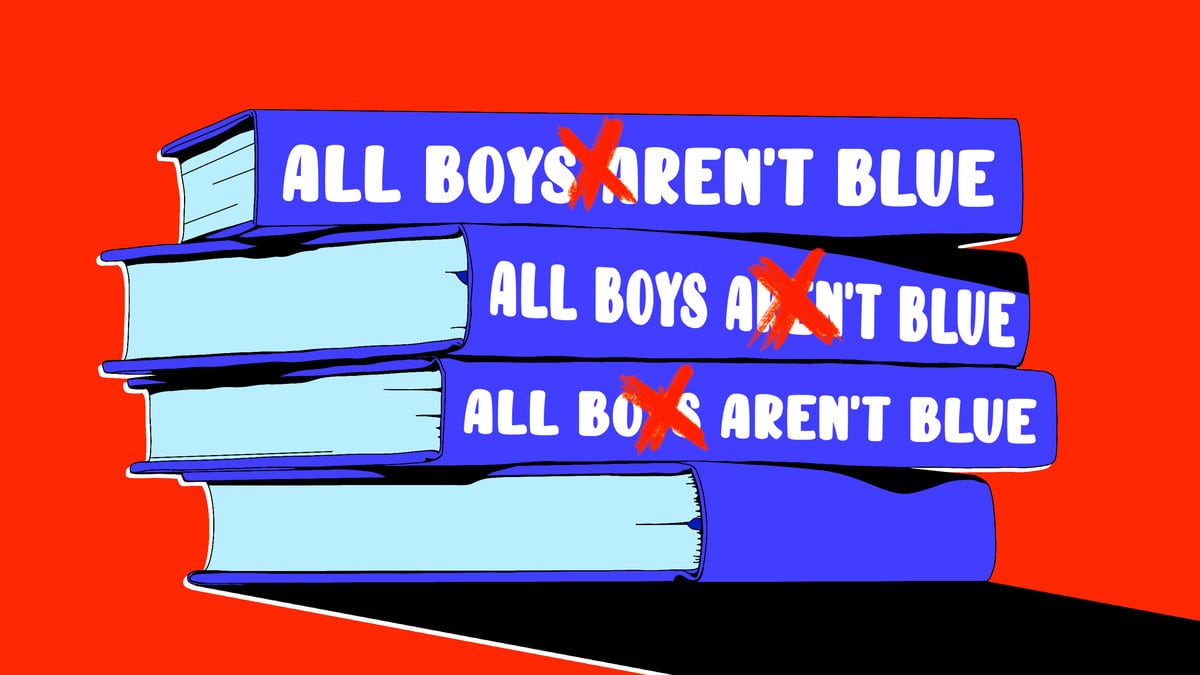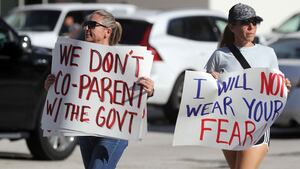For more than a year after its publication, author George Johnson’s memoir All Boys Aren’t Blue was met with universal acclaim. The book, an account of Johnson’s upbringing as a queer Black boy, landed on “best of 2020” lists at Kirkus Reviews and the New York and Chicago public libraries.
“There were no attacks until about eight weeks ago,” Johnson told The Daily Beast.
The shift occurred near the beginning of the 2021 school year, when a coordinated campaign against the teaching of certain race- and gender-related topics plunged school board meetings into a panic. Johnson’s book and others attracted the furor of adults in Missouri, Pennsylvania, Texas, and elsewhere.
But it was in Florida that All Boys Aren’t Blue became the subject of a more insidious tactic. There, a Flagler County School Board member filed a criminal complaint against the book, accusing it of containing pornography. The accusation is on the rise against authors of children’s and young adult literature, with school board members, far-right paramilitary groups, and politicians slinging allegations of pornography at books they don’t like.
Johnson’s was not the first young adult book targeted with bogus pornography accusations.
Author Laurie Halse Anderson’s 1999 book Speak won wide critical praise for its sensitive telling of a high schooler overcoming the trauma of sexual assault. Throughout the early 2010’s, Speak became an occasional conservative punching bag, with commentators accusing it of containing pornography in 2010 and 2014. Now the tactic is back—and more coordinated than in years past, Anderson says.
“I noticed a real upswing about two, three weeks ago,” Anderson told The Daily Beast. “That was the first time that I got the sense that this is a coordinated effort around the country. That’s very disturbing. Before that, I think any censorship attempts that I’d heard about or been contacted about have been just a parent coming to the school board, or occasionally somebody with a larger agenda.”
Today, that larger agenda is at the top of conservative legislative wishlists and Fox News segments. Critical race theory, a field of study that examines institutional racism, particularly in the legal system, became a boogeyman on the right, with Fox News decrying the academic field thousands of times in spring 2021. Much of that blitz focused on critical race theory’s supposed appearance in K-12 schools (it’s more of a higher-education field of study). A crop of conservative organizations, many of them newly formed by people who did not have children in the school districts they targeted, expanded their focus to a wider swath of classroom topics related to race, gender, and sexual orientation. Conservative lawmakers joined the trend, with nine states passing “anti-CRT” laws, some of which have faced court challenges on the grounds that they drastically limit educators’ ability to teach history and current events.
In some states, that means the threat of pornography allegations. This month, Texas Gov. Greg Abbott announced an effort remove “pornographic and obscene” books from the state’s schools. Abbott specifically championed the removal of books about gender from a Texas school’s library.
“For example, Keller Independent School District was recently compelled to remove a book from a school library titled Gender Queer: a Memoir by Maia Kobabe after complaints of the book’s pornographic drawings.”
Efforts to remove Gender Queer were actually spearheaded by parents, the Texas Tribune reported. Author Maia Kobabe, who intended the book for young adult audiences, recently penned a Washington Post op-ed describing the book’s story as part of vital coming-of-age narrative for nonbinary people. “The book has been out for two and a half years,” Kobabe writes of the sudden backlash. “Why now?”
Other far-right factions have also weaponized “pornography” allegations, specifically targeting Kobabe’s book. In part of their ongoing effort to upend school board meetings, the paramilitary group the Proud Boys recently stormed a suburban Chicago school board event to rage against Kobabe’s book, calling it pornographic. The group, all adult men, including two who were recently arrested for violent offenses at political events, accused students who defended the book of being pedophiles, the Chicago Sun-Times reported.
Anderson said the accusations are wrong (for instance, they frequently conflate “pornography” with books that address LGBT issues) and deliberately difficult to fight against.
“If they characterize books like this as pornography, then that puts the person opposing them having to work through the argument that, ‘if I’m against it, you’re saying that means I’m for pornography in the schools,’ which is absurd, of course,” she said. “It’s manipulative, it’s sneaky.”
Ultimately, Johnson said, the fight over school books isn’t about buzzwords—it’s about memory.
“When we’re gone, books will still be here. I think that’s really what the fear is, because books become a time capsule of the period you were in,” they said. Growing up queer, Johnson encountered few adults or books that shared their experience, leaving them without a roadmap for adolescence.
“I thought, in many ways, ‘Am I alone in this? Am I by myself in this? Am I the only person to feel this?’” Johnson remembered. “So when you have texts like mine and several of the other books that are being attacked in the system, people who were like me 20 years ago, they don’t have to think that they are the only person experiencing it.”
For all the adult outcry over school books, both Johnson and Anderson said they’d heard from students who have become staunch defenders of school library books. In Florida’s, Flagler County Schools, where All Boys Aren’t Blue faces a pornography charge, a group of students led a protest this month, condemning the book’s removal from library shelves.
Ironically, as the books’ opponents decry critical race theory, some of their efforts support the theory’s key arguments: that the legal system has historically been used to crack down on people of color.
“It is not lost on me, the history of white people, specifically white women who use the criminal justice system as their personal concierge service when things don’t go their way,” Johnson said. “And so what is happening, the criminal complaint, all of that, that was not by chance—it was by design.”








